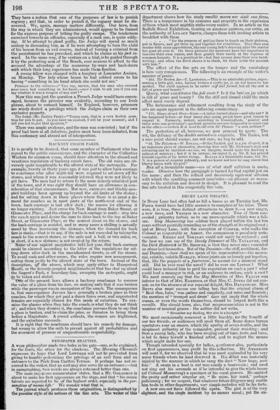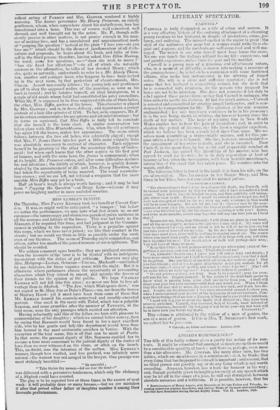DRURY LANE THEATRE.
IF Drury Lane had often had as full a house as on Tuesday last, Mr. PRICE would have had little occasion to complain of his lease. There were, it is true, three distinct attractions to draw it,—a new singer, a new farce, and VESTRIS in a neW character. Two of them suc- ceeded; gallantry forbids us to say moreAspecially which was a fail- ure. Guy Mannering has seldom been played within the last ten years without painfully reminding us of the strength of its original east; and at Drury Lane, with the exception of COOPER, who walks the Colonel as respectably as ABBOT, the comparison is peculiarly unfa- vourable. EMERY and TOKELEY could not easily be replaced ; and the best we can say of the Dandy Dinmont of Mr. T_4YLEITRE, and the Dirk Hatterick of Mr. BROWNE, is that they never once reminded us of our lost favourites. But of the Dominic—the stiff, rectilineal, for- mal Dominie,—how shall we speak of his representative—the mercu- rial, volatile, voluble HARLEY, whose joints are so loosely put together, that, like the puppets of a fantoccini, he cannot for a moment stand still. Did he ever read the novel ? did he ever see LISTON ? What could have induced him to peril his reputation on such a part ? what could lead a manager to risk, or an audience to endure, such a east? We need scarcely say that the Meg Merrilies of Mrs. FAUCIT was inferior to that of Mrs. EGERTON, or that Mrs. C. JONES did not con- sole us for the absence of our especial delight, Mrs. DAVENPORT. Miss BETTS also must excuse our telling her, that the original charm of "Rest thee, babe," was pathos and simplicity, not noise and flourish ; the mention of" trumpet and drum" does not imply that the whole stanza, or even the words themselves, should be brayed forth like a reveille. She should learn, also, that mispronunciation is not in the number of musical graces : the author did not write,
" Sleumber my darling, thy sire is a kneight."
We must occasionally comment a little harshly, for the benefit of our fair friends, or audiences will spoil them all. Some dozen barren spectators roar an encore, which the apathy of seven-tenths, and the misplaced gallantry of the remainder, prevent their resisting; and thus a young lady, who has been singing out of time, taste, and tune, is led to fancy herself a finished artist, and to neglect the means which might make her one. Though intended specially for ladies, gentlemen also, particularly on first appearances, may profit by this reflection. Mr. ANDERSON Will need it, for we observed that he was most applauded by his very noisy friends where he least deserved it. His debut was materially injured by the manner in which he sang the duet" Now hope, ,now fear." A swain in a boat is not necessarily a boatswain ; and need not sing out his serenade as if he intended to give the whole house (of Colonel Mannering) a specimen of his vocal powers. He omitted the pretty and rather singular air, " Be mine, fair maid," perhaps judiciously ; for we suspect, that whatever future diligence may enable him to do in other departments, very' simple melodies will be his forte. A new one-act farce followed the opera. The plot is of the very slightest, and the single incident by no means novel ; yet the ex- cellent acting of FARREN and Mrs. GLOVER rendered it highly amusing. The former personates Mr. Henry Primrose, an elderly
gentleman, whom, when somewhere about his sixtieth year, love has transformed into a beau. This was of course well conceived, well dressed, and well brought out by the actor. Mr. P., though suffi-
ciently precise in other matters, is not precise enough in his man- ner of making love, and has a roundabout and ungrammatical mode of "popping the question :" instead of the plain "I love you—do you love me ?" which should be the thema et fundamentum of all decla- rations and proposals, he beats about the bush, and talks of him- self in the third person: therefore, having asked Miss Ellen Murray, his ward, some few questions, as—" does she wish to marry ?" "has she fixed her affections ?"—to all of which she naturally answers in the affirmative, he talks of her devoted Henry ; which she, quite as naturally, understands to refer to a Mr. Henry Thorn- ton, another and younger lover, who happens to have been locked up in the next room, by that perfection of chambermaids, Mrs. ORGER. Assent necessarily follows ; the young lady and gentleman go off to obey the supposed wishes of the guardian, as soon as his back is turned ; and he betakes himself, an ideal bridegroom, to a couple of old maids whom habit had constituted his privy councillors. While Mr. P. is supposed to be thus employed with one of these ladies, the other, Miss 141n, arrives at his house. This character is played by Mrs. GLOVER; and is, in dress, delivery, and deportment, a perfect portrait of a lady-like spinster of 1780. To her, as he supposes, Mr. P. on his return communicates his acceptance and intended marriage ; but in terms so equivocal, that Miss Win is fairly left to conclude that she herself is the bride elect. A similar conversation has taken place with Miss Winterblossom, who, when the old gentleman has again left the house, makes her appearance. The scene which follows, between the two old ladies, was admirably played ; except that Mrs. C. JONES threw into her part a little more vulgarity than was absolutely necessary to contrast of character. Each supposes herself to be granting to the other the secondary dignity of brides- maid ; but when each learns that the other aspires to the first post of honour, and with the same hero, the fracas is commenced ; when at its height, Mr. Primrose enters, and after some difficulties declares his real intention ; the futility of which, however, is quickly demon- strated by the announcement of Mr. and Mrs. Henry Thornton, who had taken the opportunity of being married. The usual reconedia- • tion ensues ; and we are left, not without a suspicion that the more amiable Miss 'ADM may yet be a bride. Half an hour's laugh is always worth having ; and it may be had from " Popping the Question"—at Drury Lane—whereas it may prove no laughing matter in more secluded societies.



















 Previous page
Previous page